| 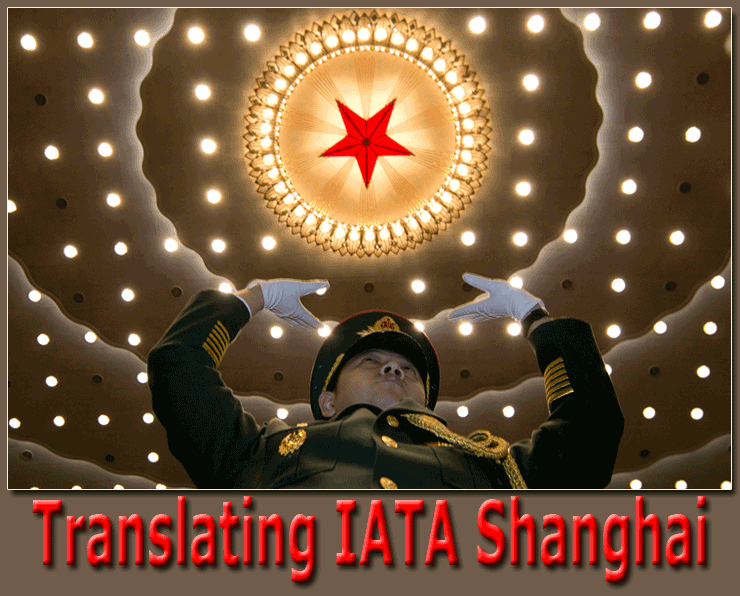
While air cargo is making headlines in Shanghai
this week, the most dramatic picture in China this month was of a military
band conductor during the opening session of the National People's Congress
at the Great Hall of the People in Beijing last week.
IATA World Cargo Symposium public sessions continue through Thursday.
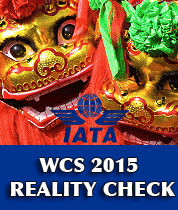 If
the stated theme at IATA World Cargo Symposium in Shanghai is “improving
the customers experience,” then so far, the mood of the majority
of the assembled air cargo executives here has not improved. If
the stated theme at IATA World Cargo Symposium in Shanghai is “improving
the customers experience,” then so far, the mood of the majority
of the assembled air cargo executives here has not improved.
People showed up here in part to get a glimpse
of where the industry is heading.
Instead, the scene that unfolded could have
been written by Jack Womack, whose novel Let’s Put The Future Behind
Us about a Russian entrepreneur of the special kind and the obstacles
he had to overcome made him famous.
A Matter
of Translation
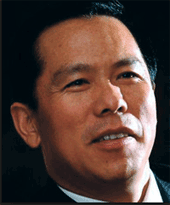 The majority of people attending the WCS
opening plenary gathering in the China ballroom of the Pudong East Shangri-La
were surprised to learn that they would need translation devices, which
were handed out by IATA staff.
The majority of people attending the WCS
opening plenary gathering in the China ballroom of the Pudong East Shangri-La
were surprised to learn that they would need translation devices, which
were handed out by IATA staff.
Since the “Deputy Mayor of Shanghai’
(who kept his greetings brief and vanished immediately afterwards, which
made noting his name unnecessary) as well as Liu Shaoyong, (left) board
chairman of China Eastern Airlines, and Jing Yiming, President, Shanghai
Airport Authority addressed the audience in Mandarin, the translation
devices fed the majority of the attendees a rough grist of what had been
said.
Slowly as the event kicked off, the assembled
cargo executives removed their headphones and turned their attention to
their I-Phones, BlackBerries, and other mobile devices—not a good
sign.
Lost In Translation?
While Mr. Shaoyong acknowledged the challenges
air cargo was facing, particularly in China, and bemoaned the bygone “long
golden age of air cargo,” he focused on what he called “bottlenecks
for the industry” and called for a “modernization of outdated
business processes through IT.”
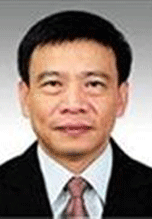 Mr.
Shaoyong certainly had his facts right, but he may have failed to explain
the complexity of issues at hand—or else these subtleties were lost
in translation: Mr.
Shaoyong certainly had his facts right, but he may have failed to explain
the complexity of issues at hand—or else these subtleties were lost
in translation:
For example, his explanation that “air
cargo industry is not isolated, but is part of the supply chain and in
for a win-win future” puts words together without really saying
anything.
Maybe such phraseology is still acceptable
at a Chinese board meeting, but the audience of the world’s cargo
executive clearly expected more.
Mr. Yiming (right) in turn promoted Shanghai
as a cargo hub of excellence, highlighting the advantages of a free trade
zone and PVG’s recent successful wooing of UPS establishing a regional
hub there.
In essence, the message brought forward
by the Chinese speakers was: Give us your business, but on our terms.
One subject that was not touched by the
early speakers was the growing shift back from outsourced production in
China to other parts of Asia, Eastern Europe, and Mexico—and the
reasons behind it.
Mikuriya
Talked Experience
Those immersed in conversations via their
mobile gadgets were shaken when Secretary General of the World Customs
Organization Mr. Kuriko Mikuriya took the stage, because Mr. Mikuriya
had both something to say and said it well.
Outlining lessons learned from the 2010
Yemen incident and highlighting the need to share trade- and transport-related
information for security purposes, Mr. Mikuriya emphasized the importance
of e-commerce and the need for customs regulations adapting to the need
for speedy clearance and release of goods empowering the consumer, which
was a statement directly targeting the topic in question, “Improving
the Customer Experience.”
Tyler On
Message
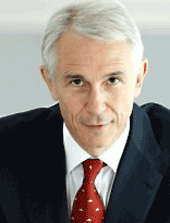 IATA
Director General Tony Tyler’s address to the WCS audience was less
predictable than one might have anticipated. IATA
Director General Tony Tyler’s address to the WCS audience was less
predictable than one might have anticipated.
While Mr. Tyler acknowledged China’s
role as a main driver of growth in air transport, he insisted that air
cargo must keep itself at the forefront of business transformation.
Elaborating on current issues in the air
transport chain, Mr. Tyler highlighted the issues pertinent to the transport
of Lithium batteries by air and emphasized that the “safe handling
of Dangerous Goods would continue to be a number one priority of IATA
to ensure both a safe and secure air transport environment,” while
admitting that such a safe and secure regimen does pose a considerable
global challenge when considering the impact of Lithium batteries because
of “the worrying issues with willful non-compliance” on the
side of some stakeholders, in particular shippers.
IATA Economic
Outlook
The economic outlook delivered by IATA’s
Senior Economist Julie Perovic was actually even more predictable than
could be reasonably expected.
Anyone reading air transport briefs would
have been able to recite the headlines she gave by heart:
“Cyclical gains but challenges and
risks remain,” “a $50-per-barrel drop in crude oil prices
compared to 2014,” and “a strong economic upturn would really
help”—hardly news at this point.
 The
forward-looking comments were also less than news: “economic cycle
is positive but weak albeit the air cargo industry benefiting from a cyclic
upturn;” Ms. Perovic reiterated that “performance by region
is uneven” but that “asset utilization had improved, although
considerable new capacity (predominantly on the passenger side) still
continues to arrive.” The
forward-looking comments were also less than news: “economic cycle
is positive but weak albeit the air cargo industry benefiting from a cyclic
upturn;” Ms. Perovic reiterated that “performance by region
is uneven” but that “asset utilization had improved, although
considerable new capacity (predominantly on the passenger side) still
continues to arrive.”
“Yields continue to decline,”
said Ms. Perovic, adding, “air cargo is likely to get cheaper”
followed by the fact that air cargo had lost 5.4 percent in volume to
the maritime sector compared to the previous year.
While one would have expected some form
of IATA Action list to combat the worrisome trends of declining yields
and increased capacity, none followed—instead, Ms. Perovic moved
to what she called the “threat of growing trade protectionism.”
While she hinted that the “economic
backdrop was improving”—with ASPAC (except Japan), MEA, and
Africa leading growth and Europe and Japan lagging behind, she explained
that the “heads of cargo [of IATA member airlines] were positive
about demand.”
How that fit in with declining yields and
new capacity was not further explained—likely, because IATA may
have learned from past experiences not to make predictions about the future
since these tend to be off track.
How Are We
Doing?
Part of the opening plenary was Glyn Hughes’
update on IATA’s achievements on past promises.
It is fair to say that IATA worked off their
agenda items and delivered to a large degree, although Mr. Hughes’
statements clearly lacked “the vision thing.”
With a focus on Dangerous Goods and Pharma
regulations, we learned IATA has undertaken a much needed modernization
of its outdated Cargo Agency Program.
A new MoU with The Universal Postal Union
(UPU), enhanced ULD Guidelines (delayed because of IATA’s 2009 firing
of its former manager, ULD Standards), CO2 reporting tools together with
Security-CSD and e-CSD with a “transformation of the air cargo industry’s
facility capabilities matrix,” and the ACI European Union ACC3 Secure
freight updated was included in Hughes’ ticking off of the IATA
“mission accomplished” list.
Don Vito
|





